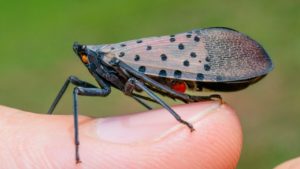
Remember these outdoor safety tips for ticks, mosquitos, the spotted lanternfly, and poison ivy.
Summer is a great time to enjoy the outdoors, tend to your landscape, and appreciate the flourishing plants and wildlife around you. However, summertime also sees an increase in pests and plants aggravating our lives. As more people spend time outdoors, they must take extra precautions against ticks, mosquitos, poison ivy, and spotted lanternflies. These pests can do anything from cause irritation to transmit diseases. At Scientific Plant Service, we want to ensure everyone enjoys a safe summer season. Remember these crucial tips regarding common summer pests and plants. Call Scientific Plant Service if you need comprehensive services to keep your landscape safe.
Tick Prevention
Ticks are more than just a nuisance. They can carry diseases including Lyme disease and Rocky Mountain spotted fever. Remember these outdoor safety tips to protect yourself and your loved ones:
- Wear Protective Clothing: When venturing into wooded or grassy areas, wear long pants and long sleeves and tuck your pants into your socks to reduce exposed skin.
- Use Tick Repellent: Apply a tick repellent containing at least 20% DEET, picaridin, or IR3535 to exposed skin and clothing.
- Check for Ticks: After spending time outside, thoroughly check your body and your pets for ticks. Pay close attention to hidden areas like the scalp, behind the ears, and armpits.
- Keep Your Yard Tidy: Maintain a clean yard by regularly mowing the lawn, removing leaf litter, and trimming tall grasses and bushes where ticks like to hide.
Discourage Mosquito Habitats
Mosquitoes are common summer pests and are not only irritating but can transmit diseases like West Nile virus and Zika virus. To minimize their presence in your outdoor space:
- Eliminate Standing Water: Mosquitoes lay eggs in standing water, so remove any sources of standing water around your home. This includes bird baths, clogged gutters, plant saucers, and pet water bowls.
- Use Mosquito Repellent: When spending time outdoors, apply insect repellent containing DEET, picaridin, or lemon eucalyptus oil.
- Install Screens: Make sure your windows and doors are fitted with tight screens to prevent mosquitoes from entering your home.
- Plant Natural Repellents: Consider planting mosquito-repelling plants such as citronella, lavender, and marigolds around your yard.
Poison Ivy Precautions
Poison ivy is notorious for causing itchy and painful rashes. It’s important to know how to identify and avoid this plant:
- Recognize Poison Ivy: Learn to identify poison ivy, which typically has clusters of three glossy green leaves. Remember the saying, “Leaves of three, let it be.”
- Wear Protective Gear: When gardening or hiking in areas where poison ivy might be present, wear long sleeves, pants, and gloves.
- Wash Off Immediately: If you think you’ve come into contact with poison ivy, wash the area immediately with soap and water. This can help remove the plant’s oil before it causes a reaction.
- Clean Contaminated Items: Poison ivy oil can linger on clothing, tools, and pets. Make sure to wash these thoroughly to prevent accidental exposure. You can find more poison ivy safety tips from Scientific Plant Service here.
Take Notice of the Spotted Lanternfly
The spotted lanternfly is an invasive species that significantly threatens trees and plants. Our summer outdoor safety tips include how to react to a sighting of the Spotted Lanternfly. Here’s what you need to know:
- Identify the Lanternfly: These insects are about one inch long, with distinctive gray wings spotted with black and bright red hind wings.
- Report Sightings: Sightings of the spotted lanternfly in Harford or Cecil counties no longer need to be reported. However, residents of all other Maryland counties are urged to report observations to the Maryland Department of Agriculture as soon as possible. Submit your report to the MDA online.
- Inspect Outdoor Items: Check outdoor furniture, vehicles, and other items for spotted lanternfly eggs, especially if you are traveling from an area known to have these pests.
- Remove and Destroy: If you find lanternfly eggs on trees or other surfaces, scrape them off into a bag with rubbing alcohol to kill them.
You can find more information about the appropriate Spotted Lanternfly prevention and treatment from the University of Maryland.
Following these outdoor safety tips can significantly reduce the risks associated with common summer pests and plants. At Scientific Plant Service, we are dedicated to helping you maintain a comfortable and pest-free environment. If you need professional assistance or more information, please contact us!
Scientific Plant Service Is Your Go-To Source In Landscape Healthcare
Scientific Plant Service, located in Baltimore, is a privately owned corporation, chartered in Maryland in 1957 by Frank J. Burke. We started as a full-service Arborists specializing in the care of shade trees and ornamental shrubs, but today we are a Lawn Care company that is a huge part of the community. From aquatic environments and snow management to deer and mole control, SPS has services tailored specifically for your lawn and landscape.
We offer services in Maryland, Washington, DC, and Virginia, including: Harford, Baltimore, Carroll, Frederick, Howard, Anne Arundel, Montgomery, Prince Georges, Talbot, Queen Anne’s, Calvert counties in MD, as well as Loudoun County, Fairfax County, Arlington, Alexandria, and Falls Church in VA. For more information, contact us online, or call us at 410-321-0970. Be sure to follow us on Facebook, Twitter, LinkedIn, Instagram, and Pinterest.

